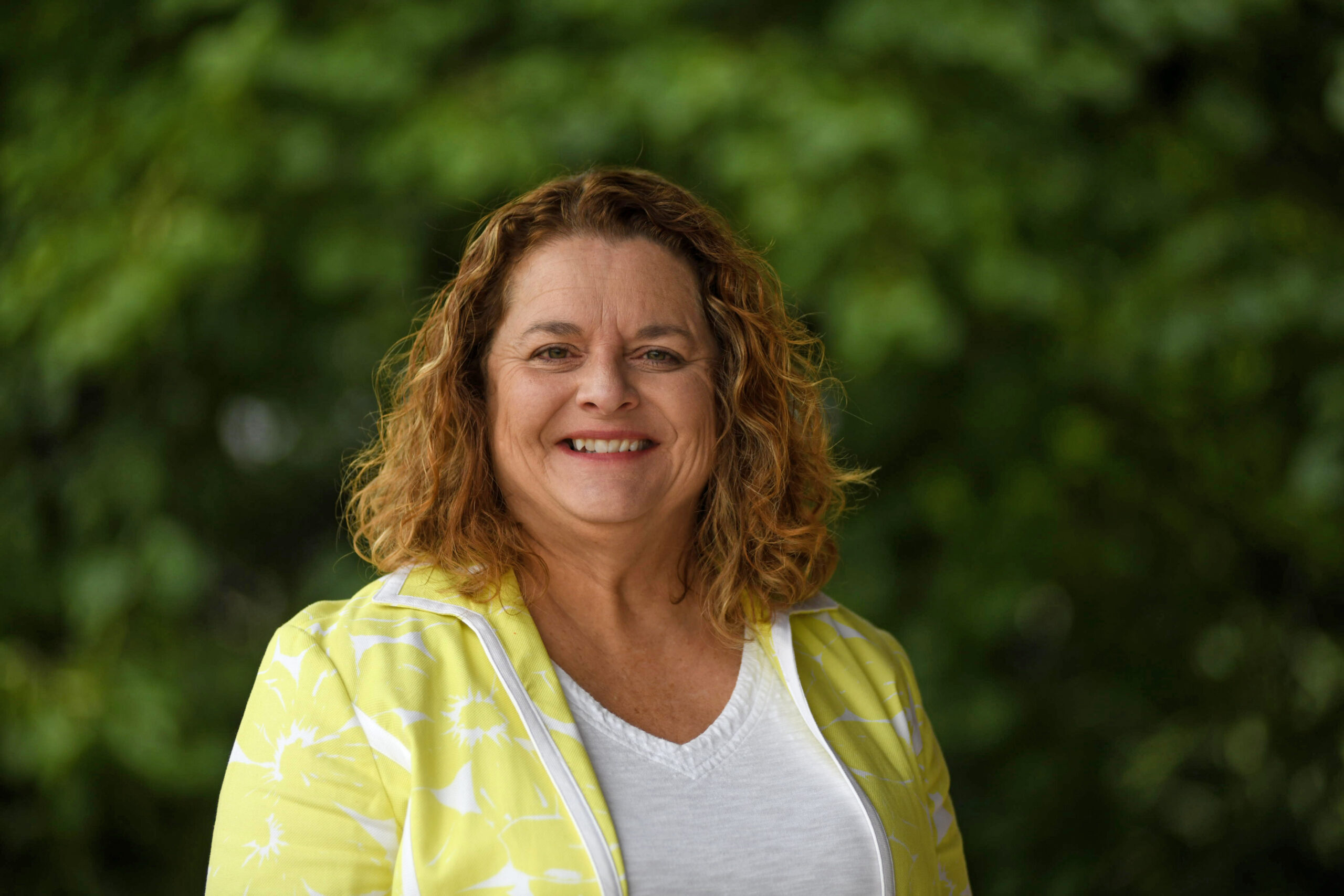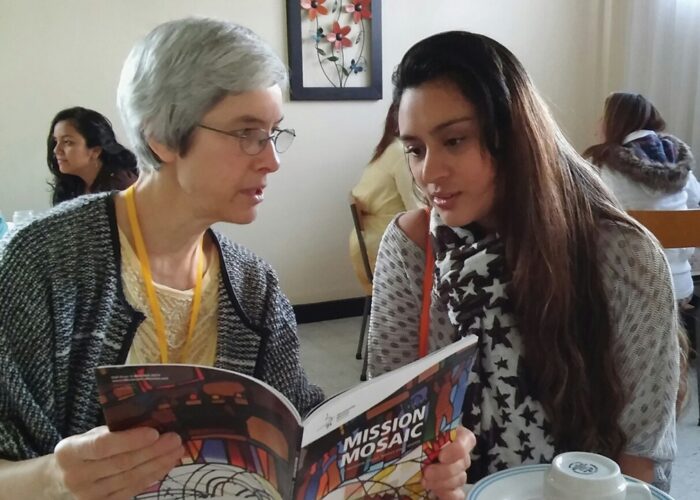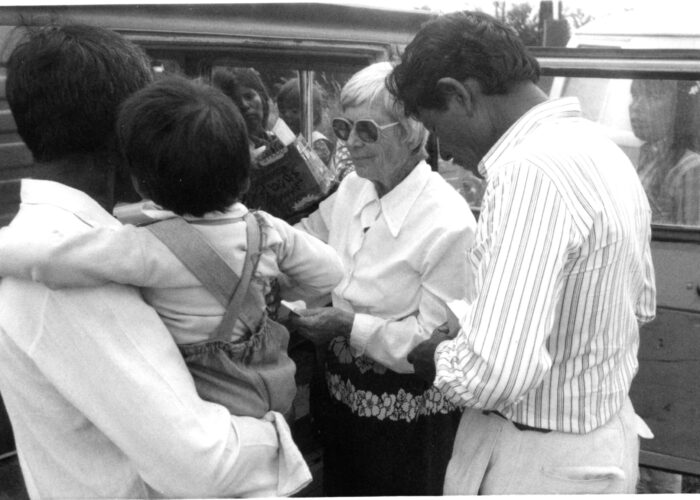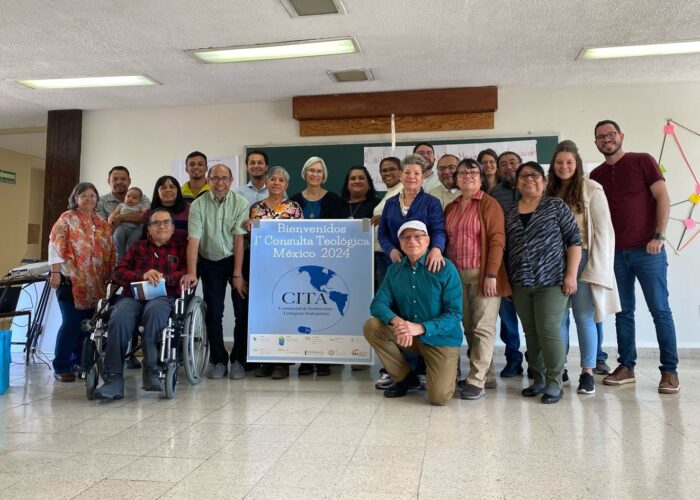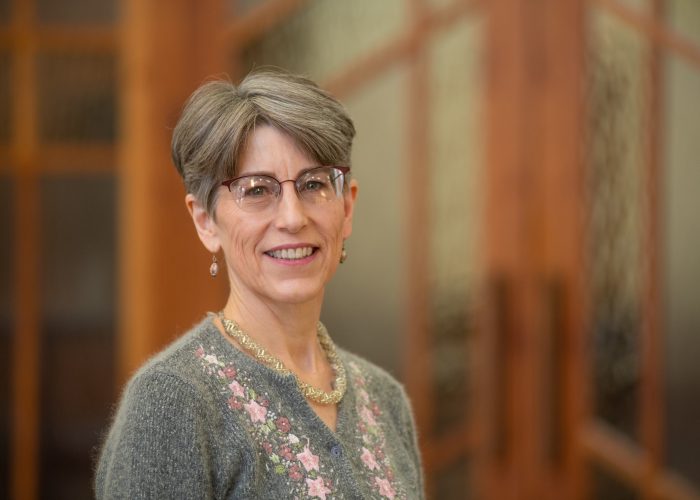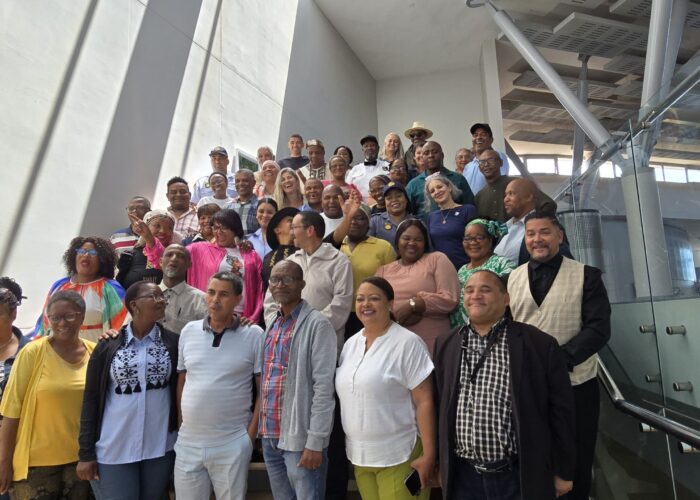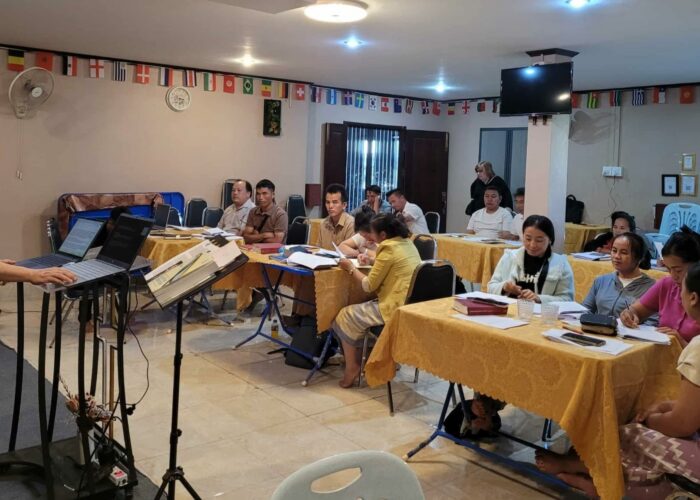Linda Shelly, Mennonite Mission Network director for Latin America, is preparing to retire after a transition period with a new director. Praise God for the many deep relationships that she has nurtured during her 23 years of serving in this capacity.
Known for her gift of connecting people, churches, and ministries, Linda’s career is marked by fostering partnerships, empowering local leadership, and advancing peace, justice, and theological education across Latin America.
As a young mission worker in the 1980s, Linda Shelly stood on the muddy banks of a Bolivian river, arms outstretched, learning to sing “Maravilloso es el amor de Dios” (Wonderful is the love of God) — a children’s song about God’s boundless love. The river was too high to cross alone, so, while waiting for help, she embraced the moment and began practicing to sing with Sunday school children, her voice rising over the rush of water. It was a simple act, but one that crystallized a lesson she carried through decades of mission work to
- embrace vulnerability
- sing with joy even when off-key
- trust in God’s love through every challenge
Linda’s service journey began in her youth, where formative experiences planted seeds for volunteering. After graduating from Bethel College with a bachelor’s degree in history and social science, she joined Mennonite Central Committee (MCC), first in Akron, Pa., and then in Latin America and Caribbean programs, immersing herself in voluntary service.
MCC, Bolivia and Honduras
In 1980, she ventured to Bolivia, a move that stretched her in profound ways. As part of a non-formal education team, Linda supported young teachers, and along with her MCC housemate who was a nurse, began a library in their home, helped start a Sunday school, and conducted health education and nutrition workshops, including skits to illustrate the lessons.
She worshipped at a small Assemblies of God church and occasionally attended a Catholic mass when the priest visited her community.

Two years into her Bolivian service, MCC called with a new challenge. Salvadoran refugees were fleeing violence, swimming across the Lempa River to escape bombs dropped by their government — bombs supplied by the United States. The Honduran Mennonite Church was responding with food and clothing, but the Honduran government labeled the refugees “subversives,” aligning with El Salvador’s regime. MCC needed a country representative to establish a long-term program, and they asked Linda to lead.
In Honduras, Linda found herself in the heart of a spiritual and political crucible. The Mennonite Church’s work with refugees led to intense Bible studies, grappling with God’s call to justice and love for all. Linda worked with refugee camps near San Marcos de Ocotepeque, interpreting for groups eager to hear the refugees’ stories. The refugees spoke of bombs falling, villages destroyed, and Catholic “delegates of the word” killed for advocating justice. One North American visitor, overwhelmed, interrupted a testimony: “How can you still believe in God after all this?”
A long silence followed. Then a refugee woman responded, “God was with us the whole time. If it hadn’t been for God, we would have all been killed.”
The refugees’ resilience and hope, despite unimaginable loss, taught Linda the power of accompaniment — God’s nearness in the darkest moments.
Linda and a local pastor took a slideshow on the road, visiting churches across Honduras to share the refugees’ stories. Through photos and testimonies, they showed how their faith compelled them to act, bridging divides within the church.

In Honduras, Linda was moved by the testimonies of Salvadoran refugees who had suffered so much and yearned for peace in their homeland. Interpreting for frequent visitors developed her interpretation skills.
After four and a half years in Honduras, Linda enrolled at Anabaptist Mennonite Biblical Seminary to process her experiences, earning an M.A. in Peace Studies. There, she wrestled with questions about loving enemies and addressing global wealth disparities. Her time in Honduras and El Salvador revealed how the wealthy clung to their wealth, fueling violence and oppression of the poor — dynamics she recognized mirrored those in North America, where similar inequalities persist. Returning to Honduras, she and an MCC colleague worked with a Mennonite pastoral family in La Esperanza, supporting the growth of a new Anabaptist faith community committed to justice and reconciliation.
Mennonite Central Committee director for Latin America and the Caribbean
Later, as MCC’s regional director for Latin America and the Caribbean, from 1992 – 2001 Linda saw the transformative power of small resources in the hands of visionary Latin American churches. She recognized how the work of mission agencies contributed to the theological development that prepared Latin America churches to embrace a holistic Gospel and to work with MCC in ministries of relief, development and peace.
Mennonite Mission Network regional director for Latin America
In 2001, as Linda prepared to leave her MCC role and move from Pennsylvania to Kansas, she received a call asking if she would consider serving as Latin America director with the newly forming Mennonite Mission Network. Initially hesitant, she committed to two years, seeing it as a way be involved in Latin America while staying in Kansas to support her mother after her father’s death. But on her first trip to Latin America, mission workers and Latin American leaders urged her to stay long-term, weary of rapid leadership transitions. Linda listened and stayed.
While serving long-term, the job evolved in encouraging ways. She enjoyed nurturing global mission partnerships bringing together churches from MC USA, Argentina, Bolivia, Colombia, Ecuador and Venezuela, while across Latin America relating with and encouraging the vision of Anabaptist and Indigenous evangelical churches.
Empowering women’s leadership
Linda is a long-time advocate for women’s leadership in Latin American churches, particularly through her engagement with the Movement of Anabaptist Women doing Theology in Latin America (MTAL).

She played a pivotal role in supporting MTAL’s initiatives, such as sharing Sister Care across Latin America, regional gatherings and scholarships. Her collaboration with Sister Care seminars throughout Latin America, supported by Mennonite Women USA, provided trauma healing and leadership training for women in countries like Brazil, Guatemala, Colombia and Mexico, further integrating peacebuilding with spiritual growth.

MTAL named her as an advisor, and she encourages and participates in projects like the development of devotional books with daily inspiration written by hundreds of Latin America Anabaptist women.
Her support for women’s leadership also extended to programs like the Q’eqchi’ Bible Institute connected with Seminario Anabautista Latinoamericano (SEMILLA – Latin American Anabaptist Seminary) in Guatemala, where Q’eqchi’ Mennonite women study the Bible and theology. Linda noted a significant shift in regional gatherings, where women’s presence as recognized leaders grew from a minority to nearly half, certainly in part due to MTAL’s influence.

Advancing theological education
In 2016, Linda responded to requests from partners by initiating a gathering of Spanish Anabaptist educators in Guatemala, representing organizations like SEMILLA and the Seminario Bíblico Menonita de Colombia, to advance online learning initiatives. This effort led to the creation of the Community of Anabaptist Theological Institutions (CITA), a network that unites institutions to increase opportunities for students worldwide to study Spanish language courses on the Bible, theology and leadership development from an Anabaptist perspective.

These virtual education programs enable students to study remotely, reducing travel barriers. Complementing virtual education, she became involved in the development of the Biblioteca Digital Anabautista, a digital library of Anabaptist resources in Spanish.
Supporting church development
Linda’s work included practical support for Latin American churches, such as securing Mennonite Men JoinHands grants for church buildings and to plant avocado trees at Q’eqchi’ Bezaleel Mennonite Educational Center in Guatemala. She also wrote proposals for grants through the Schowalter Foundation that helped expand Mission Network resources for many ministries within the region. During the COVID-19 crisis, many churches received support, encouraging their efforts to share food and fellowship despite economic hardship.

Peacebuilding
Linda’s peace studies background informed her support for initiatives like Pan y Paz (Bread and Peace) in Colombia, where churches distributed bread and promoted nonviolence on the UN International Day of Peace.
She also backed the Equipo Menonita in Argentina’s Chaco region in working with all Indigenous evangelical churches in a context where a church’s Indigenous identity is more relevant than its denomination. This contributes to Indigenous language preservation and education through the Qom Saỹaten center.

In reflecting on the value of relating cross-culturally in her role, Linda recalled an exercise in the Argentine Chaco during a gathering of mission workers serving with Indigenous churches in which everyone created lenses made of cellophane to demonstrate how we all have filters that come from our life experiences.
“When we come together with people from other backgrounds,” she said, “we understand God and God’s call for humanity more fully.”
Through theological education, women’s leadership, church development, and global networking, Linda’s role with partners and mission workers has created a legacy of mutual partnership and transformative mission work.


